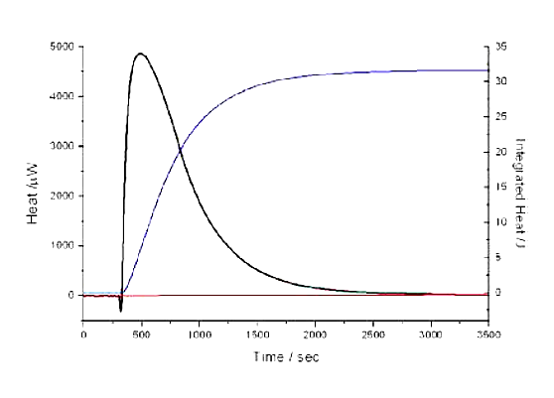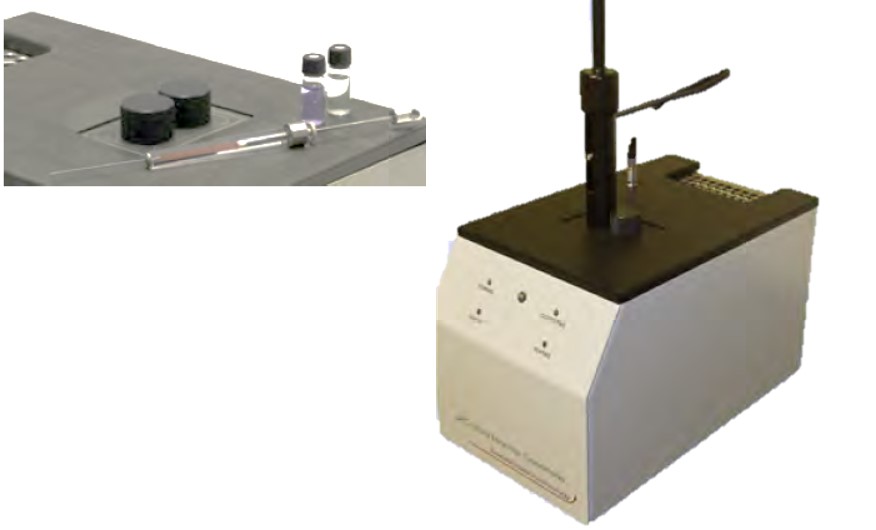Process Hazard Analysis

The Micro Reaction Calorimeter provides hazard analysis with both speed and flexibility. Working with less than 2ml total volume reduces costs, waste and time.
The μRC is capable of reducing the time requirement of a reaction calorimetry study on a process from several days to a few hours. Power compensation calorimetry measures in units of power meaning that calculation of reaction enthalpy is simply performed by dividing heat-flow integral (automatically produced) by quantity.
Using the different modes of injection (single, multiple or timed) allows batch and semi-batch processes to be simulated under safe controlled conditions. Hydrolysis reaction Process deviation studies have never been easier. Instead of generating several litres of waste over several hours for each variant considered, the micro calorimeter can generate the same information in a few minutes. This will allow proper consideration of all possible maloperations where before, time, cost and material availability may have limited the application. The more considerations of credible misoperation that are performed the safer a plant and process are. THT aim to re-empower the safety professional by providing new technologies which can considerably improve the way hazard studies are performed.
The THT Micro Reaction Calorimeter (µRC™) has a wide range of applications in the chemical, pharmaceutical and related fields. This brochure shows how using a microcalorimeter can help chemists and engineers in everyday tasks. Some of the applications detailed within this brochure include:
- Reaction Kinetics
- Process Development
- Scanning Calorimetry
- Thermal Stability
- Heat Capacity Measurement
- Adhesive Curing Reactions
- Waste Management
- End Point Determination
- Hazard Analysis
All chemical, physical and biological reactions are accompanied by heat change. These reactions, though sometimes subtle, can be measured using calorimetry. This powerful analysis method works without modification of the sample or process. The THT Micro Reaction Calorimeter is based on power compensation technology making it faster in both signal response and temperature variation. Designed for maximum flexibility, the µRC has the capability to measure both kinetic and thermodynamic parameters in both rapid and slow reactions and in solids, liquids or gases. Measurements made by calorimetry are non-destructive and non-invasive making it valuable for initial analyses and for systems where other techniques fail. With the µRC there is minimal sample preparation and no limitation on the physical state of the material. Systems can be studied under ambient or modified environmental conditions.
Specification
- Baseline Noise: From 5μW
- Dynamic Range: 5μW to 600mW
- Temperature Range: -5°C to 170°C
- Standard Modes of Operation: Isothermal/Titration/ Scanning
- Optional Modes: Pressure - pressurise cell up to 10bar
- Scanning Rate: Up to 2°C/min
- Isothermal Stability: +/- 0.0001°C over extended time period

Process Hazard Analysis - Cell Volume: 1.5 ml
- Cell Type: Removable glass vial
- Injection Volume: 1 to 250 μl
- Temperature Control: Peltier based (no external cooling)
- Stirring Speed: 0 - 400 rpm
- Measurement Principle: Power compensation
- Connection to PC: via USB cable
- Footprint (width x depth x height): 19 x 31 x 35 cm
- Certain other specifications may be possible by discussion
검색 결과 14건
- 분류 : 반응열량계
하기
